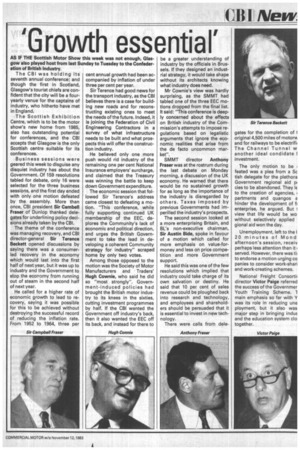'Growth essential'
Page 23

If you've noticed an error in this article please click here to report it so we can fix it.
AS IF THE Scottish Motor Show gow also played host from last S ation of British Industry.
The CBI was holding its seventh annual conference; and though the first in Scotland, Glasgow's tourist chiefs are confident that the city will be a fouryearly venue for the captains of industry, who hitherto have met in England.
The Scottish Exhibition Centre, which is to be the motor show's new home from 1985, also has outstanding potential for conferences, and the CBI accepts that Glasgow is the only Scottish centre suitable for its conferences.
Business sessions were geared this week to disguise any disquiet industry has about the Government. Of 159 resolutions tabled for debate, only 16 were selected for the three business sessions, and the first day ended with only one motion defeated by the assembly. More than once. CBI president Sir Cambell Fraser of Dunlop thanked delegates for underlining policy decisions already taken by the CBI.
The theme of the conference was managing recovery, and CBI director-general Sir Terence Beckett opened discussions by saying there was a consumerled recovery in the economy which would last into the first half of next year, but it was up to industry and the Government to stop the economy from running out of steam in the second half of next year.
He called for a higher rate of economic growth to lead to recovery, saying it was possible for this to be achieved without destroying the successful record of reducing the inflation rate. From 1952 to 1964, three per cent annual growth had been accompanied by inflation of under three per cent per year.
Sir Terence had good news for the transport industry, as the CBI believes there is a case for building new roads and for reconstructing existing ones to meet the needs of the future. Indeed, it is joining the Federation of Civil Engineering Contractors in a survey of what infrastructure needs to be built and what prospects this will offer the construction industry.
He believed only one more push would rid industry of the remaining one per cent National Insurance employers' surcharge, and claimed that the Treasury was winning the battle to keep down Government expenditure.
The economic session that followed Sir Terence's address came closest to defeating a motion. "This conference, while fully supporting continued UK membership of the EEC, deplores the Community's lack of economic and political direction, and urges the British Government to take the lead in developing a coherent Community strategy for industry" scraped home by only two votes.
Among those opposed to the motion was the Society of Motor Manufacturers and Traders' Hugh Cownie, who said he did so "most strongly". Governme nt -I n du ced policies had brought the British motor industry to its knees in the sixties, cutting investment programmes by half. If the CBI wanted the Government off industry's back, then it also wanted the EEC off its back, and instead for there to be a greater understanding of industry by the officials in Brussels. If they designed an industrial strategy, it would take shape without its architects knowing what industry does need.
Mr Cownie's view was hardly surprising, as the SMMT had tabled one of the three EEC motions dropped from the final list. It said: "This conference is deeply concerned about the effects on British industry of the Commission's attempts to impose regulations based on legalistic arguments that ignore the economic realities that arise from the de facto uncommon market".
SMMT director Anthony Fraser was at the rostrum during the last debate on Monday morning, a discussion of the UK economy. He warned that there would be no sustained growth for as long as the importance of the industry is disregarded by others. Taxes imposed by previous Governments had imperilled the industry's prospects.
The second session looked at a more enterprising Britain, and BL's non-executive chairman, Sir Austin Bide, spoke in favour of a motion which called for more emphasis on value-formoney and less on price competition and more Government support.
He said this was one of the few resolutions which implied that industry could take charge of its own salvation or destiny. He said that 10 per cent of sales revenue could be ploughed back into research and technology, and employees and shareholders should be persuaded that it is essential to invest in new technology.
There were calls from dele gates for the completion of 1 original 4,500 miles of motonA and for railways to be electrifil The Channel Tunnel w another ideal condidate 1 investment.
The only motion to be feated was a plea from a Sc tish delegate for the plethora Government regional aid pi cies to be abandoned. They IE to the creation of agencies, I partments and quangos a hinder the development of fi enterprise, he argued. But 1 view that life would be wo without selectively applied gional aid won the day.
Unemployment, left to the I 20 minutes of Mond afternoon's session, receiv perhaps less attention than it I served. However, there was tii to endorse a motion urging co panies to consider work-shari and work-creating schemes.
National Freight Consortil director Victor Paige referred the success of the Govern mer Youth Training Scheme. 1 main emphasis so far with Y was its role in reducing une ployment, but it also was major step in bringing incluE and the education system elo together.








































































































































































